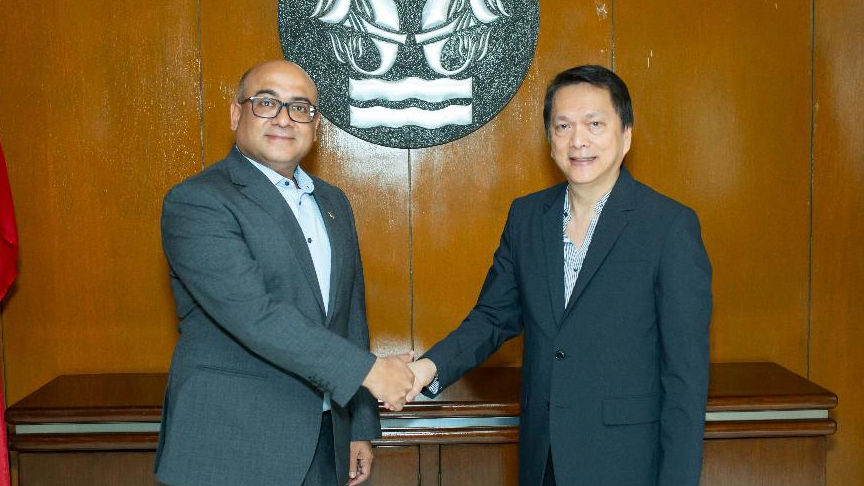NewsMakers
Why breast cancer survivors don’t take their medication, and what can be done
For roughly 80% of breast cancer survivors, treatment doesn’t end with surgery, radiation and chemotherapy. Instead, for the next five to 10 years, doctors recommend that they take medication to block sex hormones, which can fuel tumor growth and spark recurrence.

For roughly 80% of breast cancer survivors, treatment doesn’t end with surgery, radiation and chemotherapy. Instead, for the next five to 10 years, doctors recommend that they take medication to block sex hormones, which can fuel tumor growth and spark recurrence.
The drugs are life-saving: They’ve been shown to cut risk of cancer recurrence by as much as half in patients with hormone receptor-positive tumors (HR+)—the most common form of breast cancer. Yet despite their promised benefits, 40% of patients stop taking them early and a third take them less frequently than directed.
New CU Boulder research, published this month in the Journal of Clinical Oncology, sheds light on why that is and what doctors and the health care system can do about it.
It found that, overall, interventions can increase medication adherence by nearly 1.5 times. But some strategies work better than others.
“Our bottom-line finding is that there are strategies that do work in supporting women to take these life-extending medications, and that we as a cancer care community need to do better,” said senior author Joanna Arch, a professor in the Department of Psychology and Neuroscience and member of the CU Cancer Center on the Anschutz Medical Campus.
Arch noted these so-called “adjuvant endocrine therapies,” like the estrogen-blockers Tamoxifen and aromatase inhibitors, can be costly and come with a host of side effects, including weight gain, sexual side effects, joint pain, depression and sleeplessness.
“Imagine going from your normal estrogen activity to little or no estrogen within days. That’s what these medications do,” she said. “But the women who take them as prescribed also have lower recurrence rates and live longer. It’s a dilemma.”
As more next-generation cancer drugs, including chemotherapy agents, shift from infusions provided in a clinic to oral therapies taken at home, the medical community has grown increasingly interested in developing ways to make sure patients take their pills.
In a sweeping meta-analysis, Arch and her colleagues analyzed 25 studies representing about 368,000 women to gain insight into what works and what doesn’t.
Educational pamphlets are not enough
The study found that cost-cutting policy changes, such as providing generic alternatives or requiring insurance companies to cover pills at the same level as infusions, consistently worked. Such “oral parity laws” have been passed in 43 states in recent years.
In one study, participants were asked to create stickers to put on their pill boxes.
Mobile apps and texts to remind patients to take their medication and psychological/coping strategies also yielded modest improvements.
The study’s findings around managing side effects were complicated: Simply educating women on side effects, via pamphlets or verbal explanations, generally failed to increase the likelihood that women took their medication as directed.
But things such as physical therapy, exercise and behavioral counseling aimed at alleviating or managing side effects often worked.
“Education in and of itself is not enough. That is a clear finding,” said Arch, suggesting that doctors write referrals to practitioners who specialize in side effects and follow up with appointment reminders. “Most oncologists, I believe, don’t realize how low adherence is for these women. They assume that if they write the prescription, it’s being taken.”
Addressing mental health is key
One study included in the meta-analysis was Arch’s own.
In it, women were asked to identify their primary motivation for taking their medication—whether it was living to see their child or grandchild grow up, pursuing their art or running a marathon someday. Via an online program, they created a sticker with a photo representing that goal, and the words “I take this for…” below it. Then, they stuck it on their pill box.
Participants were more likely to take their pills, at least for the first month, than those who didn’t.
“Even just a tiny thing like this can help,” said Arch.
Notably, very few studies looked at whether treating depression can help. Arch, aiming to fill this gap, recently launched her own pilot trial.
“One of the most consistent predictors of not adhering to any medication is depression,” she said. “Depression taps motivation.”
The new Journal of Clinical Oncology study is the first meta-analysis to show that interventions can be helpful, and that’s important, said Arch, because insurance companies need data to make decisions about what to cover.
But the study also showed that the effects are relatively modest and that there is room for improvement.
Arch said she hopes the study will spark more research into novel ways to support survivors:
“We have a lot of work to do.”
NewsMakers
New Pru Life UK CEO pays courtesy visit to insurance commissioner
Providing financial protection to the Muslim community is another key priority of the Commission, to which Pru Life UK pledged its support and commitment.

Pru Life UK’s newly appointed CEO Sanjay Chakrabarty met with the Insurance Commissioner Atty. Reynaldo Regalado (right) to reinforce the company’s commitment and support to the Insurance Commission’s goal to advance financial literacy & inclusion in the country, and good governance in the insurance sector.
Strengthening their commitment to providing better financial protection for Filipino families, IC Commissioner Regalado and Chakrabarty shared their insights and plans to bolster financial literacy initiatives, improve governance standards, and expand access to insurance products, particularly among vulnerable and underserved populations. Providing financial protection to the Muslim community is another key priority of the Commission, to which Pru Life UK pledged its support and commitment.
“It was an honor to meet Insurance Commissioner Atty. Reynaldo Regalado and reinforce Pru Life UK’s commitment to achieving our shared goals of increasing insurance penetration in the Philippines and elevating good governance in the life insurance industry,” Chakrabarty shares.
Pru Life UK is the leading life insurer in the Philippines, recording the highest New Business Annual Premium Equivalent (NBAPE) in 2023, according to the Insurance Commission’s latest report as of 31 December 2023.
NewsMakers
Red Bull Half Court national finals now in full swing
“Red Bull provided a lot of opportunities for the basketball community in the Philippines, from Cebu, (to) Davao, and here in Manila. It really is a great help for all of the players and we hope that Red Bull will continue this event (Red Bull Half Court) every year or even better if possible twice or thrice a year for everyone to play and participate,” said Almond Vosotros from TNT Tropang Giga.

The Philippines has locked in its representatives to compete at the Red Bull Half Court 2024 in New York City, USA, following the last regional showdown in Manila last April 27 at the Bonifacio Shrine.
The journey to make it to this point has been nothing short of spectacular and exciting, as teams from across the country displayed incredible sportsmanship, skill, and resilience on the court. From thrilling buzzer-beaters to jaw-dropping dunks, the Red Bull Half Court series this year has been fierce, and yet only the top twenty four teams: eight men’s qualifying teams, eight men’s wildcard teams, four women’s qualifying teams, and four wildcard teams, were left to compete at the Red Bull Half Court 2024 National Finals.
Last April 27, the qualifying teams with dreams to compete in New York battled it out in the court. Actor and basketball enthusiast Gerald Anderson was in attendance with his team, 3rd Floor. After advancing through the Pool Phase and facing off against four other teams, they reached the Quarter Finals. Despite a valiant effort, they were bested by TNT Tropang Giga with a score of 12-11.
“It was recommended to me. I was looking for a basketball event to compete in and Red Bull Half Court was perfect,” Gerald Anderson said, explaining how he came to know about the event. “Red Bull Half Court is intense,” he commented. “(It’s) very hot due to the intense heat, but overall the concept is great for everyone.”
In the end, Almond Vosotros, Levin Flores, Chester Saldua, and Matt Salem of TNT Tropang Giga and Sam Harada, Kaye Pingol, Eunique Chan, and Afril Bernardino of Uratex Dream earned the prestigious chance to represent the Philippines on the global stage for the Red Bull Half Court 2024 World Finals. Their hard work and dedication have evidently paid off, and these attributes brought them one step closer to their ultimate goal.
“Red Bull provided a lot of opportunities for the basketball community in the Philippines, from Cebu, (to) Davao, and here in Manila. It really is a great help for all of the players and we hope that Red Bull will continue this event (Red Bull Half Court) every year or even better if possible twice or thrice a year for everyone to play and participate,” said Almond Vosotros from TNT Tropang Giga.
Kaye Pingol from Uratex Dream expressed their gratitude and enthusiasm to Red Bull for providing women an opportunity to be seen in a bigger stage, “Red Bull Half Court is a big win for our team, especially (since) women’s basketball isn’t often seen or given a bigger platform here in the Philippines.”
In addition to the thrilling matchups on the court, the Red Bull Half Court 2024 National Finals also featured performances by the Philippine All Stars, Pricetagg, Zae and DJ Razikyle. Their electrifying routines brought an extra dimension of entertainment to the event, showcasing not only the incredible agility but also the vibrant cultural scene of the Philippines.
Moreover, amidst the basketball action and artistic performances, attendees were treated to an art showcase by Raco Ruiz. His unique artistic vision brought a touch of creativity and flair to the event. Red Bull’s collaboration with Raco Ruiz and the Manila LGU extended to the revamping of a chosen basketball court for a local community in Manila, including painting a mural for the floor and hoop backstops. Adding to the spectacle, live art demonstrations on the hoop backstops further enriched the atmosphere, and highlighted both sports and artistry in the country.
With their heads held high, the winning teams, TNT Tropang Giga and Uratex Dream now prepare to be the Philippine representatives at the Red Bull Half Court 2024 World Finals, where they’ll face off against formidable teams from different regions.
“This is a really big opportunity, not only for us but women’s basketball in general, to have an opportunity to showcase our talent, and we are extremely happy that we won and will be representing the Philippines in New York,” said Kaye Pingol of Uratex Dream.
The Red Bull Half Court 2024 World Finals will take place in New York this October, where the best street basketball talent from around the globe will battle it out in an unforgettable series of tournaments. As each team prepares for their next challenge, they carry with them the hopes and dreams of a nation united by the love of the game.
NewsMakers
Loneliness worse than smoking, alcoholism, obesity; primary care clinicians can offer solutions
53 percent of older adults in the primary care population experience loneliness. Evidence also suggests that when older adults experience loneliness their physical and mental health related to quality of life are reduced significantly.

Loneliness is a significant biopsychosocial stressor with a mortality risk comparable to smoking more than 15 cigarettes a day and more harmful than alcoholism, obesity and lack of physical activity.
Despite its harmful effects, interventions to address the discrepancy between desired and actual social interaction are few and limited.
In a new study, Regenstrief Institute and Indiana University School of Medicine research scientists Monica Williams-Farrelly, PhD, Malaz Boustani, M.D., MPH, and Nicole Fowler, PhD, MHSA, identified evidence suggesting primary care clinicians can play an important role in developing and maintaining personal connections for patients experiencing loneliness.
The study found that 53 percent of older adults in the primary care population experience loneliness. Evidence also suggests that when older adults experience loneliness their physical and mental health related to quality of life are reduced significantly.
“The first and obvious answer for loneliness is for primary care physicians to screen their patients,” said Dr. Williams-Farrelly, the study’s first author, a Regenstrief research scientist and an assistant research professor at IU School of Medicine. “Based on the literature and research, loneliness has influences on health that are quite significant and quite strong, so in the same way that we ask older adults: Do you smoke? Or do you measure your blood sugar? We should be inquiring about and measuring loneliness and offering solutions.”
Dr. Williams-Farrelly suggests that it is imperative for primary care physicians, nurse practitioners and other clinicians also to provide resources to patients to help address this significant issue.
“The topic of loneliness is more relevant now than ever given the May 2023 U.S. Surgeon General’s call to action to tackle the loneliness epidemic,” said Dr. Fowler, principal researcher and senior author.
“This research is important because it identifies and suggests evidence for interventions that are necessary for older adults in primary care who experience loneliness. Primary care clinicians should discuss loneliness with their older adult patients and provide resources to help them create meaningful social relationships.” Dr. Fowler also is a Regenstrief research scientist and an associate professor and a director of research at IU School of Medicine.
An effective intervention, the researchers suggest, is the Circle of Friends concept, which consists of a three-month, group-based, psychosocial rehabilitation model aimed at enhancing interaction and friendships between participants. The model has shown effectiveness in both reducing loneliness and improving health outcomes including subjective health, cognition, mortality and lower healthcare costs.
“As older adults age, they have a lot of changes in their life due to a lot of circumstances – retirement, divorce or the death of family and friends – making it a little more difficult for them to maintain social relationships. When connections are lost with coworkers or loved ones, it can be jarring,” said Dr. Williams-Farrelly. “Older adults need their primary care physicians to screen and suggest effective resources that can allow them to maintain, foster and develop social relationships.”
Data was gathered during the COVID-19 pandemic, but the researchers identified a steadily increasing trend in loneliness in this population prior to the global pandemic. The numbers are still increasing today.
“Loneliness may seem simple, but it can be complex to identify and address. It started to become a problem before COVID-19, and then with the national stay-at-home order caused by the pandemic, social contact was being prevented, which exacerbated the problem,” said Dr. Williams-Farrelly.
This study used baseline data from the Caregiver Outcomes of Alzheimer’s Disease Screening (COADS) clinical trial.
-

 NewsMakers7 days ago
NewsMakers7 days ago‘Always be Chic by Miss Kayce’ launched
-

 Beauty & Fashion3 weeks ago
Beauty & Fashion3 weeks agoUNIQLO Mall of Asia store reopens on May 17
-

 Destinations4 weeks ago
Destinations4 weeks agoSingapore Cable Car launches world’s first Skyorb Cabins
-

 Destinations4 weeks ago
Destinations4 weeks agoJapan ranks as top leisure travel destination for Filipino travellers: Visa study
-

 NewsMakers1 week ago
NewsMakers1 week agoI.E. Medica and MedEthix win healthcare awards in Singapore
-

 NewsMakers3 weeks ago
NewsMakers3 weeks agoAerobic exercise can help fight liver diseases
-

 NewsMakers3 weeks ago
NewsMakers3 weeks agoGolden Visa Centrale to hold consultation roadshow on Greek Golden Visa program
-

 NewsMakers3 weeks ago
NewsMakers3 weeks agoAlcohol raises heart disease risk, particularly among women


























